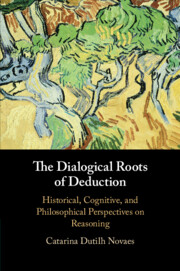 The Dialogical Roots of Deduction
The Dialogical Roots of Deduction from Part II - The History of Deduction
Published online by Cambridge University Press: 10 December 2020
This chapter retraces the genealogical development of deduction in the Latin and Arabic medieval traditions and in the early modern period, and finally the emergence of mathematical logic in the nineteenth century. It is shown that dialogical conceptions of logic remained pervasive in the Latin medieval tradition, but that they coexisted with other, non-dialogical conceptualizations, in part because of the influence of Arabic logic. In the modern period, however, mentalistic conceptions of logic and deduction became increasingly prominent. The chapter thus explains why we (i.e. twenty-first-century philosophers) have by and large forgotten the dialogical roots of deduction.
To save this book to your Kindle, first ensure no-reply@cambridge.org is added to your Approved Personal Document E-mail List under your Personal Document Settings on the Manage Your Content and Devices page of your Amazon account. Then enter the ‘name’ part of your Kindle email address below. Find out more about saving to your Kindle.
Note you can select to save to either the @free.kindle.com or @kindle.com variations. ‘@free.kindle.com’ emails are free but can only be saved to your device when it is connected to wi-fi. ‘@kindle.com’ emails can be delivered even when you are not connected to wi-fi, but note that service fees apply.
Find out more about the Kindle Personal Document Service.
To save content items to your account, please confirm that you agree to abide by our usage policies. If this is the first time you use this feature, you will be asked to authorise Cambridge Core to connect with your account. Find out more about saving content to Dropbox.
To save content items to your account, please confirm that you agree to abide by our usage policies. If this is the first time you use this feature, you will be asked to authorise Cambridge Core to connect with your account. Find out more about saving content to Google Drive.